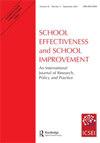Searching for the impact of national culture dimensions on student achievement: implications for educational effectiveness research
IF 2.8
3区 教育学
Q1 EDUCATION & EDUCATIONAL RESEARCH
引用次数: 0
Abstract
ABSTRACT To explore the wider educational environment included in the dynamic model of educational effectiveness, this paper reexamines the association between student achievement and two national culture dimensions: Monumentalism-Flexibility and Collectivism-Individualism. Using Programme for International Student Assessment (PISA) 2018 data of 317,127 students, 12,058 schools, and 41 countries, we evaluated three-level regression models controlling for students’ socioeconomic status, gender, and grade; school’s average socioeconomic status; and countries’ wealth. The results of the multilevel regressions show significant negative associations of the two culture dimensions with student achievement in mathematics, science, and reading. However, our models indicate that Monumentalism-Flexibility is a better predictor of student achievement in mathematics and science, and that there is variation in effect sizes across domains. Implications for educational effectiveness research are drawn.探寻民族文化维度对学生成绩的影响:对教育有效性研究的启示
为了探索教育有效性动态模型中包含的更广泛的教育环境,本文重新审视了学生成绩与两个民族文化维度:纪念主义-灵活性和集体主义-个人主义之间的关系。利用国际学生评估项目(PISA) 2018年的数据,我们评估了41个国家的317,127名学生、12,058所学校的三级回归模型,控制了学生的社会经济地位、性别和年级;学校的平均社会经济地位;以及国家的财富。多元回归结果显示,这两个文化维度与学生在数学、科学和阅读方面的成绩呈显著负相关。然而,我们的模型表明,纪念性-灵活性是一个更好的预测学生在数学和科学方面的成绩,并且在不同的领域有不同的效应大小。对教育有效性研究的启示。
本文章由计算机程序翻译,如有差异,请以英文原文为准。
求助全文
约1分钟内获得全文
求助全文
来源期刊

School Effectiveness and School Improvement
EDUCATION & EDUCATIONAL RESEARCH-
CiteScore
6.60
自引率
0.00%
发文量
23
期刊介绍:
School Effectiveness and School Improvement presents information on educational effectiveness, practice and policy-making across primary, secondary and higher education. The Editors believe that the educational progress of all students, regardless of family background and economic status, is the key indicator of effectiveness and improvement in schools. The journal strives to explore this idea with manuscripts that cover a range of subjects within the area of educational effectiveness at the classroom, school or system level, including, but not limited to: •Effective pedagogy •Classroom climate •School ethos and leadership •School improvement and reform programmes •Systemwide policy and reform
 求助内容:
求助内容: 应助结果提醒方式:
应助结果提醒方式:


